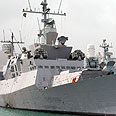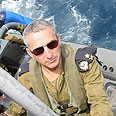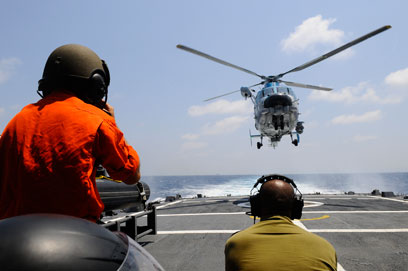
An Israel Navy torpedo ship
Photo: Rafi Barbiro

Naval Commander Brigadier General Ram Rotberg
The gas rigs
defense plan will be will be sent to the cabinet for approval and will include requests for manpower and a massive budget. The General Staff and the Defense Ministry have approved the plan which is meant to secure four drilling facilities and will cost an estimated NIS 3 billion ($760 million) annually.
"This is a strategic asset, it's like shifting land the size of the State of Israel to the sea," stressed Naval Commander Brigadier General Ram Rotberg.
Related stories:
- Gov't pushing for 4 natural gas processing facilities by 2013
- Israeli gas quests plagued by pirates
- MKs on high seas check security layout at gas rig
According to the plan, Israel will purchase four coast guard ships, each the size of an IDF torpedo boat on which it will place the Barak defense system – or a naval Iron Dome, as the IDF likes to call it – advanced radar and tracking system.

Middle East upheavals causing concern (Archives: IDF Spokesman)
Some 250 troops, officers and NCOs will be manning the ships which will patrol the rig area and respond to various threats including missiles, mines boat bombs and more.
As of now the rigs' security is in the hands of civilian security companies that offer solutions for threats in the immediate vicinity of the rig. Yet Israeli navy torpedo boats have been operating in the area over the last two years in order to secure the sensitive facilities that are located 180 kilometers off of Israel's coastline in what is known as the economic waters.
The IDF has previously emphasized that it would avoid posting soldiers or weapons on the rigs themselves so that they would not be defined as a military facility which would then "offer legitimization" for an attack on the rigs.
Separate budget
Securing the rigs has joined the many tasks carried out by the navy in the last two years. "We carried out dozens of operations with joint forces and the idea is to remain under the radar," a senior naval officer explained.
"Some of the operations focused on the prevention of weapons smuggling from Iran to the Gaza Strip and Hezbollah – through the Red Sea – while the main smuggling route moved to Libya after Gaddafi's regime fell," the officer noted.
According to the officer, some of the smuggling attempts are thwarted by Egypt out of their own interests and fears that the weapons will eventually be aimed at them.
The IDF will demand that the budget for the patrol boats will be separate and in addition to the defense budget. The navy will have to purchase a total of seven torpedo boats in order to continue with the current security missions and the many special operations the navy has taken upon itself in the last two years.
The navy is following the situation in Syria over growing concerns that a potential leak of P-800 Yakhont missiles from Assad's crumbling regime could fall into Hezbollah hands, a situation which would lead to a practical "naval blockade" on Israel as the missiles are capable of reaching Ashdod.
"The recent upheavals in the Middle East have not skipped over the naval arena. The waters may seem calm, but underneath there are maelstroms that obligate us to prepare," the naval commander explained.
- Receive Ynetnews updates
directly to your desktop















